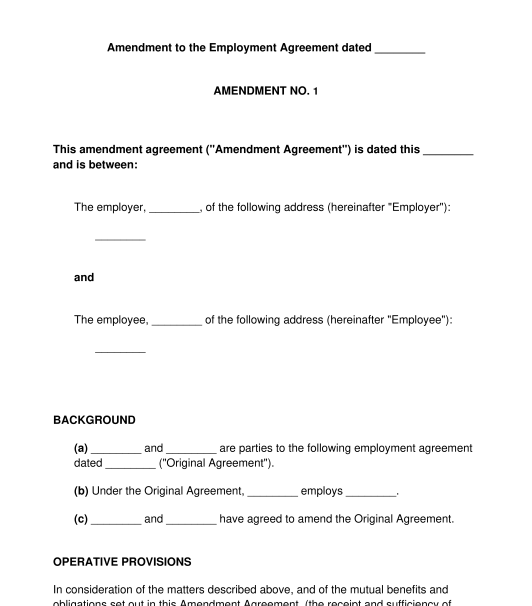 18/11/2025
18/11/2025

Answer a few questions and your document is created automatically.

Your document is ready! You will receive it in Word and PDF formats. You will be able to modify it.

 18/11/2025
18/11/2025
 Word and PDF
Word and PDF
 5 pages
5 pages
An Employment Contract Amendment is a document that can be used to make formal changes to an existing employment contract. It can be used to document revisions, additions and deletions to the terms and conditions of an employment relationship.
An amendment does not replace the entire original contract, just the part that is changed by the amendment. It is not designed to be used as a standalone contract.
If there only need to be several changes to a contract, it can be much easier to create an amendment than to create an entirely new contract from scratch.
An Employment Contract Amendment is specifically adapted for an employment situation. For other contracts, see our general Contract Amendment.
An Employment Contract Amendment can be used to make changes to an existing Employment Agreement. It does not contain all of the key terms that need to be included in an Employment Agreement.
On the other hand, an Employment Agreement is used when there is no existing contract in place between the employer and the employee. It sets out all of the key terms about the employment relationship, such as the employee's role and duties, their rate of pay and any benefits they may receive.
Many employment contracts expressly state that they can only be amended in writing. For these kinds of contracts, it is important to use an Employment Contract Amendment or some other kind of written document when making changes to the contract.
Even if the contract does not explicitly state that it needs to be amended in writing, it is best practice to use a written amendment document when making changes. Without written proof, there is a high risk of misunderstanding and disputes, as the parties might remember things differently. It will also be hard to prove what was agreed, if there is ever a disagreement.
The parties should check the original employment contract to ensure that the changes they are planning to make are permitted.
There is no strict limit on the number of times that a contract may be amended. However, once a contract has been amended multiple times, it can become increasingly difficult to keep track of the changes.
If the parties start to worry that this is happening, then they often decide to create a new Employment Agreement from scratch. If they do this, the parties should make it clear that the new contract recognises the employee's prior service and that their employment is continuous. This may be relevant to accrued entitlements such as long service leave, superannuation, annual leave and redundancy pay. If in doubt, seek legal advice.
Provided that both the employer and the employee agree, there are many parts of an Employment Contract that can be amended. This includes:
When making changes to the Employment Contract, the employer should be conscious of the employee's entitlements in the National Employment Standards or any applicable award or enterprise agreement, or anti-discrimination laws in the relevant state or territory. Even if both parties agree, the contract cannot be changed to include worse conditions (for the employee) than these minimum standards.
In addition, the employer should be careful to avoid claims of breach of contract or constructive dismissal. For example, if a full time employee is pressured to become a casual, or if their remuneration or other entitlements are being reduced, then there is a risk that this could be found to be a case of constructive dismissal - where the employee is not actually fired, but the employer's behaviour effectively forces them to resign. If in doubt, seek legal advice.
Once the Employment Contract Amendment has been completed, it should be signed by both parties.
The amendment should then be filed and maintained with the original employment contract so that anyone looking at the contract will know that it has been amended.
An Employment Contract Amendment should include information such as:
An Employment Contract Amendment creates permanent changes to the employment contract. If the parties intend the changes to only apply for a limited period of time, then they will need to ensure that they make this clear when drafting the changes. For example, if the parties only intend for the changes to remain in effect until a particular date or event, then they should make this clear when preparing the document.
The Fair Work Act 2009 (Cth) and the National Employment Standards (NES) apply to most employment situations in Australia. Further information is available from the Fair Work Ombudsman.
However, in addition, many employment situations are also governed by modern awards or enterprise agreements. If such an award or agreement applies, then that will set out some additional minimum standards with which the employer must comply.
General principles of contract law also apply to contract amendments.
If in doubt, seek legal advice.
You fill out a form. The document is created before your eyes as you respond to the questions.
At the end, you receive it in Word and PDF formats. You can modify it and reuse it.
A guide to help you: What to do after Preparing a Contract
Employment Contract Amendment - sample template
Country: Australia